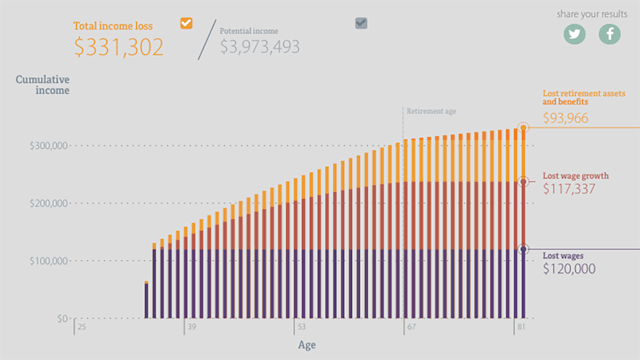This Wage Calculator Shows What It Costs To Leave The Workforce To Care For A Child

Staying home to avoid child care costs can have a big impact on your lifelong earnings
To work or not to work, for many moms that is the question. Faced with the insane costs of putting a child (or children) in daycare, many parents pull out their calculators to see if their salary would offset the cost of childcare when deciding when or if they should go back to work after having a baby.
But Michael Madowitz, an economist at the Center for American Progress, says there’s more to consider when making this decision. He says it’s not as simple as taking the cost of childcare and subtracting that amount from your annual salary. He’s developed a calculator that shows you the long term effects of either working or staying home. You can customize the calculator to account for your gender, age, how much you earn, how long you plan to be out of the workforce and your retirement contributions. Depending on whether or not you work outside the home, the results are either reassuring or completely depressing.
Madowitz told Working Mother that he came up with the calculator when he and his wife became parents. His wife is a mathematician, and they were trying to decide if he should stay home to care for the kids or if they should pay for childcare. When discussing the situation with other friends in the same boat, he realized their numbers didn’t match up. “We were talking about our decision in this long-term framework, and a lot of other people were talking about it in terms of, ‘I bring home X, and childcare costs Y,” he explains. He argues that this is too simple a way of looking at the situation. When you’re not working, you’re not just missing out on your wages, you’re also missing out on the chance to earn raises and retirement plan contributions. Over time these extras add up.
For example, take this hypothetical scenario as calculated by Madowitz’s program. Say you’re a 29-year-old female who started working full time at age 25 and currently makes $40,000 a year. If you plan to take a year off to care for your child, you’ll lose $40,000 in wages. But according to the calculator taking that time off will cost you an additional $43,207 in lost retirement benefits and $57,095 in wage growth (meaning this is the effect taking a year off will have on raises you receive) during your entire career. That’s $140,302 loss of income over a lifetime.
In short — even if you plan to go back to work at some point, taking any time off to care for your kids will cost you.
Image via Center for American Progress
The gender wage gap is real, and it increases when women become moms. Taking time off to care for your children can have a big long term impact on your lifelong earnings and retirement savings. But deciding to put your kids in childcare so you can work isn’t the clear winner here either. The annual cost of childcare for one child is more than the price of tuition at some colleges. And don’t even get us started on the giant dose of mom judgment that gets dished out when people hear you’re “letting a stranger raise your baby.”
What we need are affordable childcare options for families and jobs that don’t view maternity/paternity leave as a strike against their employees when evaluation and promotion season comes around. And since we’re daydreaming here, universal paid maternity/paternity leave would be nice, too.
But none of that is likely to happen anytime soon. So whether you’re a stay at home mom or a mom who works outside the home, at least we know we’re all getting screwed together.